|
(c)
Copyright Bartók Archives of the Hungarian Academy of Sciences
Institute for Musicology, 2004-2005
Folklore and Nationalism
|
| |
| |
At the beginning of his career he would
not even have dreamt that he would ever become a
folklorist.
Until the age of twenty-four he travelled
the customary road of the professional musician in a
double
capacity: his first and main business was the
piano, and alongside this was composition. ...
Zoltán Kodály, “Bartók the Folklorist,” in The
Writings of Zoltán Kodály (Budapest, 1974), 102
|
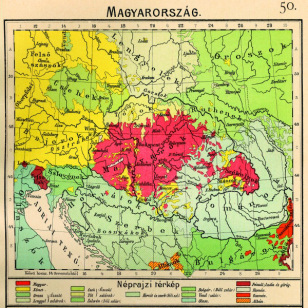
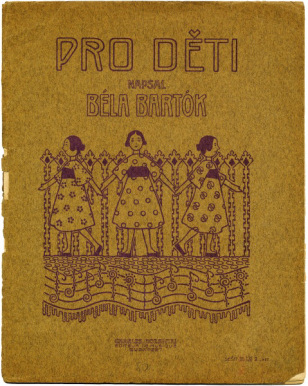 |
|
The principal scene of my research has been Eastern
Europe. As a Hungarian I naturally began my work with
Hungarian folk music, but soon extended it to
neighbouring territories—Slovakian, Ukrainian, Rumanian.
Occasionally I have even made jumps into more remote
countries (in North Africa, Asia Minor) to gain a
broader outlook. …
From the very beginning I have been amazed by the
extraordinary wealth of melody types existing in the
territory under investigation in Eastern Europe. As I
pursued my research, this amazement increased. In view
of the comparatively small size of the
countries—numbering forty to fifty million people—the
variety in folk music is really marvellous! …
What can be the reason for this wealth? How has it come
to pass? … Comparison of the folk music of these peoples
made it clear that there was a continuous give and take
of melodies … This give and take is not so simple as
many of us might believe. When a folk melody passes the
language frontier of a people, sooner or later it will
be subjected to certain changes determined by
environment, and especially by the differences of
language. …
It is obvious
that if there remains any hope for the survival of folk
music … an artificial erection of Chinese walls to
separate peoples from each other bodes no good for its
development. A complete separation from foreign
influences means stagnation: well assimilated foreign
impulses offer possibilities of enrichment.
There are significant parallels in the life of languages
and the development of the higher arts. English is
impure in comparison with other Teutonic languages;
about forty per cent of its vocabulary is of
non-anglo-Saxon origin. Nevertheless it has developed
incomparable strength of expression and individuality of
spirit. …
Bartók, “Race Purity in Music” (1942),
Béla Bartók Essays, ed. Benjamin Suchoff (London, 1976),
29–31
It would be going too far to give here a detailed
description of the differences between Kodály’s works
and mine. I will mention only one essential difference—a
difference in procedure which may account (at least
partly) for the differences in style. Kodály studied,
and uses as source, Hungarian rural music almost
exclusively, whereas I extended my interest and love
also to the folk music of the neighbouring Eastern
European peoples and ventured even into Arabic and
Turkish territories to make research. In my works,
therefore, appear impressions derived from the most
varied sources, melted—as I hope—into unity. These
various sources, however, have a common denominator,
that is, the characteristics common to rural folk music
in its purest sense. One of these characteristics is the
complete absence of any sentimentality or exaggeration
of expression. It is this which gives to rural music a
certain simplicity, austerity, sincerity of feeling,
even grandeur...
Bartók, “Hungarian Music” (1944), in
Béla Bartók Essays, ed. Benjamin Succhoff (London,
1976), 394–95

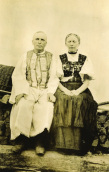
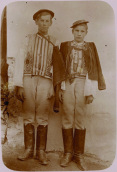
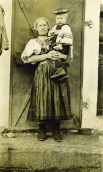 |
|

It cannot be denied that the impulse to begin folk
song research … is attributable to the awakening of
national feeling. The discovery of the values of
folklore and folk music excited the national pride …
Small nations, especially the politically oppressed
ones, found a certain consolation in these treasures,
their self-consciousness grew stronger and consolidated
… But soon these nations encountered some
disappointment: however little they were concerned with
similar values of the neighbouring peoples, it still was
unavoidable to come inadvertently in contact now and
then with some aspect of the neighbouring nation’s
cultural treasures of this kind. And so the trouble
began.
The offended
national sentiment had to defend itself somehow—offended by the fact that the neighbouring nation was
also in possession of the treasure which up to that
point had been considered as an ancient, original
national property—and did so by claiming priority. But
as the same sentiment and similar ideology held sway in
the neighbouring nation, the latter, too, would not
yield from the conviction that the priority was theirs…
…when
researchers are obliged to state that in the folk music
of different peoples there are interactions of
importance, such as foreign influence or foreign origin,
then these statements will be quite unfavourable to a
considerable number of these nations. We should also
consider that such “unfavourable” conclusions neither
provide reason for an inferiority complex nor are they
fitting for political capitalization. …
It is
regrettable that the ideological tensions of our time
further the spread of such morbid one-sidedness instead
of promoting an unbiased view. If, however, the
above-mentioned partiality gains the upper hand in
scientific discussions, that will be the end of science.
Bartók, “Folk Song Research and
Nationalism” (1937), in Béla Bartók Essays, ed. Benjamin
Suchoff (London, 1976), 25
|
|
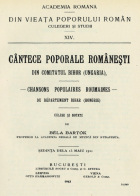
|
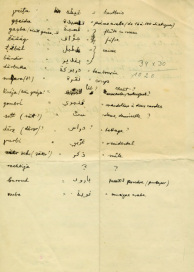
 |
|
In 1913 he learned Arabic because of his Arabian
collecting. And in 1938 [recte
1936], on account of his collecting trip at the
invitation of the Turkish government, he studied enough
Turkish to be able to write down his recordings himself.
Alongside such knowledge of languages and such
exceptional musical ability, only the collector’s
passion was necessary to make a large-scale folklorist
out of anyone. And that, too, was there: from early
childhood Bartók loved to collect insects and
butterflies (later bringing home some specimens from
Africa). ...
Zoltán Kodály, “Bartók the Folklorist,”
in The Writings of Zoltán Kodály (Budapest, 1974),
105–106
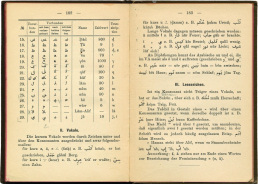
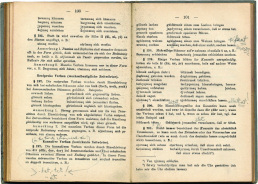
|
Talking about rural life, let me add my own
observations concerning the relationship between
peasants of different nationalities. ... They live
peacefully side by side, each speaking his own language,
following his own customs, taking it for granted that
his neighbour, speaking another language, does the same.
An overwhelming proof of this is offered by the words of
the lyric folk songs, the mirror of the people’s soul.
It is hard to find among these words any thought
expressing animosity towards other nationalities. And
even if we should find a line or two poking fun at the
foreigner, these have no more significance than some of
the words by which the people of the soil good-naturedly
ridicule their pastor or their own shortcomings.
There is
peace among the peasants; hatred against their brothers
is fostered only by the higher circles.
Bartók, “Folk song Research in Eastern
Europe” (1943), Béla Bartók Essays, ed. Benjamin Suchoff
(London, 1976), 34
|
|
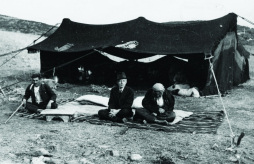 |
|
|
| |

|
|